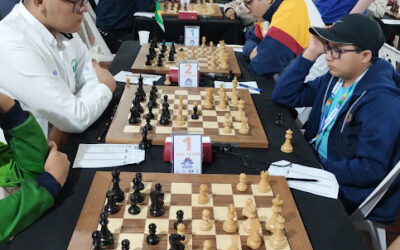Por Thorsten vom Wege – Comisión de Balonmano de la AIPS
BASILEA, Suiza, 6 de julio de 2021.- Una federación internacional celebra su cumpleaños, la Federación Internacional de Balonmano cumple 75 años. Hay algunas especulaciones sobre la fecha exacta de fundación, algunas fuentes mencionan el 11 de julio de 1946, otras señalan que la fundación tuvo lugar el 12 de julio, porque 35 miembros fundadores firmaron una resolución en esta fecha en un hotel de Copenhague, Dinamarca.
Sea como fuere, el balonmano fundó su federación internacional en el verano de la posguerra, pero la historia de este deporte es mucho más antigua. Los antiguos griegos conocían un juego relacionado con el balonmano y lo llamaban Urania, mientras que los romanos llamaban al balonmano Harpaston. Hay pruebas de ambas formas de juego. Las actuales se encuentran 800 años antes de Cristo. También se pueden encontrar juegos similares al balonmano desde la Edad Media, ya que el alemán Walter von der Vogelweide contó sobre ellos, y se juegan en la actual Italia, el sur del Tirol, Suiza, Irlanda, Inglaterra y Francia. E incluso en el lejano norte, los inuit lanzan las pelotas con las manos -no está documentado si con o sin guantes-.

Sin embargo, el balonmano en su forma actual se desarrolló casi en paralelo en al menos tres países, en Suecia, Dinamarca y Alemania, a finales del siglo XIX. Por eso a los tres les gusta afirmar que inventaron el deporte. El hecho es que el danés Holger Nielsen y el alemán Konrad Koch establecieron las primeras reglas, y en realidad -al menos tal y como las compuso la FIB- varios antepasados ayudaron a dar a luz a dos bebés al mismo tiempo: el balonmano de campo y el balonmano de sala, en aquella época más bien llamado balonmano de campo pequeño .
Se puede tomar esto con muchos padres literalmente: había goalball, Königsbergball, el juego de goalball de Wiesbaden, Ceska Hazena, Balón Uruguayo. En resumen, el mundo estaba maduro para un nuevo deporte. Así que sólo era cuestión de tiempo que los berlineses Max Heiser y Carl Schelenz establecieran las reglas que todavía hoy conforman el juego en sus aspectos básicos.
El hecho de que los jugadores de balonmano tardaran más de 20 años en fundar su propia federación internacional se debe a la historia contemporánea, ya que, al igual que otros deportes de pelota, el balonmano pasó por primera vez bajo el paraguas de la IAAF, la Federación Internacional de Atletismo, en 1926.
Dos años más tarde existía un departamento más o menos independiente llamado IAHF, que posiblemente pueda considerarse el precursor de la FIB. Eso ocurrió en 1928, en torno a los Juegos Olímpicos de Ámsterdam, y el famoso estadounidense Avery Brundage fue uno de los padres de la organización. Por cierto, el baloncesto se despidió de la IAHF en 1934.
Aunque Brundage fue elegido posteriormente presidente del COI, la relación entre el balonmano y los Juegos Olímpicos se vio perturbada durante mucho tiempo. En 1936, el balonmano de campo celebró su estreno olímpico en Berlín. El primer campeonato mundial de balonmano en pista cubierta se disputó en 1938, por supuesto en Alemania, y desde luego los anfitriones también se proclamaron campeones del mundo. Fue un torneo de cuatro naciones y el Mundial se extendió de viernes a domingo.
Esto ha cambiado un poco desde entonces. Hoy en día, el balonmano es un deporte global, lo cual no se debe a los cerca de 200 países miembros de la FIH, sino sobre todo al hecho de que el balonmano se practica con éxito en Sudamérica, Asia y África, mientras que Norteamérica y Oceanía no son tan fuertes. Los alemanes fueron excluidos de la fundación de la FIB en 1946 debido a la guerra, el sueco Gusta Björk se convirtió en el primer presidente, el actual titular Hassan Moustafa (quinto presidente de la FIH) ha gobernado la asociación desde el cambio de milenio y aunque el egipcio no logra consensos, logró desarrollar el balonmano hasta convertirlo en un deporte global económicamente exitoso.
El balonmano de campo ahora sólo se practica como un hobby de algunos entusiastas, mientras que el balonmano interior está gobernando, el Campeonato Mundial no demanda muchas semanas. Por la influencia de la federación continental (europea), la FIH perdió algo de poder y dinero, si se tiene en cuenta las competiciones de la Liga de Campeones y la Copa de Europa, pero gracias a ser un deporte olímpico los ingresos de la FIB siguen siendo enormes.
El balonmano masculino forma parte de los Juegos Olímpicos desde 1972 y el femenino desde 1976, y la eterna lucha por determinar qué deporte de equipo es el número dos después del fútbol probablemente seguirá siendo una preocupación de la FIB durante los próximos 75 años. Es posible que la federación mundial sufra algunos cambios tras el fin de la era Moustafa por motivos de edad (76 años). Sin embargo, aún se desconoce cuándo será eso, porque el presidente quiere volver a presentarse a las próximas elecciones.
—
ENGLISH
From field handball to a global sport: International Handball Federation celebrates its 75th anniversary
By Thorsten vom Wege – AIPS Handball Commission
BASLE, July 12, 2021.- An international federation is celebrating its birthday, the International Handball Federation is getting 75 years old. There is some speculation about the exact date of foundation, some sources mention July 11, 1946, others point out that the foundation took place on July 12, because 35 founding members signed a resolution on this date at a hotel in Copenhagen, Denmark.
Whatever is the case, handball had founded its international federation in the summer of the post-war year, but the history of the sport is much older. The ancient Greeks knew a game related to handball and named it Urania, while the Romans called handball Harpaston – there is evidence for both forms of play, the current ones can be found 800 years BC. Games similar to handball can also be found from the Middle Ages, as German Walter von der Vogelweide sang about them, and they are played in today’s Italy, South Tyrol, Switzerland, Ireland, England and France. And even in the far north, the Inuit toss the balls with their hands – whether with or without gloves is not documented.
However, handball in its present form developed almost in parallel in at least three countries, in Sweden, Denmark and Germany and the end of the 19th century. That is why the three people like to claim that they invented the sport. The fact is that the Dane Holger Nielsen and the German Konrad Koch laid down the first rules, and actually – at least as the IHF composed them – several forefathers helped give birth to two babies at the same time – field handball and indoor handball, at that time more likely called small-field handball .
You can take that with the many fathers literally, there was goalball, Königsbergball, the Wiesbaden goalball game, Ceska Hazena, Uruguayan Balon – in short, the world was ripe for a new sport. And so it was only a matter of time before the Berliners Max Heiser and Carl Schelenz set rules that still shape the game to this day in its basics. The fact that it would take more than 20 years before the handball players founded their own international federation is due to contemporary history, because like other ball sports, handball first slipped under the umbrella of the IAAF, the international athletics federation, in 1926.
Two years later there was a more or less independent department called the IAHF, which may possibly be seen as the forerunner of the IHF. That happened in 1928, around the Olympic Games in Amsterdam and famous US -American Avery Brundage was one of the fathers of the organization. By the way, basketball said goodbye to the IAHF in 1934.
Though Brundage later was elected IOC President, the relationship between handball and the Olympic Games was disturbed for a long time. In 1936, field handball celebrated its Olympic premiere in Berlin. The first indoor handball world championship was played in 1938, of course in Germany and of course the hosts also became world champions. It was a 4-nation tournament and the World Cup lasted from Friday to Sunday.
That has changed a bit since then. Today, handball is a global sport, which is not due to around 200 IHF member countries, but above all to the fact that handball is played successfully in Spouth America, Asia and Africa, while North America and Oceania are not that strong. The Germans were excluded from the founding of the IHF in 1946 due to the war, the Swede Gusta Björk became the first president, the current incumbent Hassan Moustafa (fifth IHF president) has ruled the association since the turn of the millennium and even if the Egyptian is not undisputed, he managed to become one to develop handball to an economically successful global player.
Field handball is now only practiced as a hobby of some enthusiasts, while indoor handball is ruling, the World Championship not takes several weeks. By the implementation of continental federation, IHF lost some power and money, if you talk about Champions League and European Cup competitions, buth thanks to being an Olympic sport the revenues of IHF are still huge.
Men’s handball is an integral part of the Olympic Games since 1972 and women since 1976, and the eternal struggle to determine which team sport is number two after football will probably continue to be a concern of the IHF for the next 75 years. Possibly the world federation will go through some changes after the age-related end of the Moustafa era. When that will be, however, is still unknown, because the president wants to run again for the next election.



